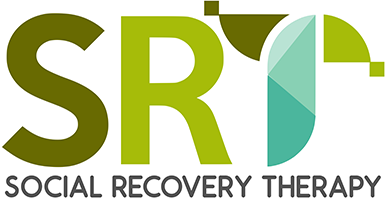Structured activity and multiple group memberships as mechanisms of increased depression amongst young people not in employment, education or training
Full Article Clio Berry, Matthew J. Easterbrook, Liza Empson, and David Fowler Abstract Aims Young people Not in Employment, Education and Training (NEET) are at increased risk of depression, yet mechanisms of this association are poorly understood. We hypothesised that being NEET has both behavioural and social identity consequences and that reductions in structured activity and multiple group memberships underlie increased depression in this group. Our purpose was to assess first whether depression was...
Social Recovery Therapy in improving activity and social outcomes in early psychosis: Current evidence and longer term outcomes
Full Article David Fowler, Joanne Hodgekins, and Paul French Abstract Background Social Recovery Therapy (SRT) is a cognitive behavioural therapy which targets young people with early psychosis who have complex problems associated with severe social disability. This paper provides a narrative overview of current evidence for SRT and reports new data on a 2 year follow-up of participants recruited into the Improving Social Recovery in Early Psychosis (ISREP) trial. Method In the ISREP study 50 participants...
Social recovery therapy in combination with early intervention services for enhancement of social recovery in patients with first-episode psychosis (SUPEREDEN3): A single-blind, randomised controlled trial
Full Article David Fowler, Jo Hodgekins, Paul French, Max Marshall, Nick Freemantle, Paul McCrone, Linda Everard, Anna Lavis, Peter Jones, Tim Amos, Swaran Singh, Vimal Sharma, and Max Birchwood Abstract Background Provision of early intervention services has increased the rate of social recovery in patients with first-episode psychosis; however, many individuals have continuing severe and persistent problems with social functioning. We aimed to assess the efficacy of early intervention services augmented with social recovery...
Metacognitive beliefs as psychological predictors of social functioning: An investigation with young people at risk of psychosis
Full Article Measha Bright, Sophie Parker, Paul French, David Fowler, Andrew Gumley, Anthony P. Morrison, Max Birchwood, Peter B. Jones, Suzanne L.K. Stewart, and Adrian Wells Abstract Poor social functioning has been found to be present in those at risk for psychosis. This study aimed to examine metacognitive beliefs as potential predictors of structured activity (measure of social functioning) in those with an At Risk Mental State (ARMS). Regression and correlation analyses were...
Pathways to care of young people accessing a pilot specialist youth mental health service in Norfolk, United Kingdom
Full Article Jo Hodgekins, Timothy Clarke, Hannah Cole, Constantina Markides, Uju Ugochukwu, Peter Cairns, Rebecca Lower, David Fowler, and Jon Wilson Aim Pathways to care (PtC) are a means of examining and understanding routes into mental health care. It is important to examine PtC in order to identify ways in which individuals access services, as well as highlighting barriers or delays to appropriate treatment. This study aimed to examine PtC experienced by young...
The course of negative symptom in first episode psychosis and the relationship with social recovery
Full Article Brioney Gee, Jo Hodgekins, David Fowler, Max Marshall, Linda Everard, Helen Lester, Peter B. Jones, Tim Amos, Swaran P. Singh, Vimal Sharma, Nick Freemantle, and Max Birchwood Abstract Aims To investigate trajectories of negative symptoms during the first 12 months of treatment for first episode psychosis (FEP), their predictors and relationship to social recovery. Method 1006 participants were followed up for 12 months following acceptance into Early Intervention in Psychosis services. Negative symptom trajectories...
Comparing time use in individuals at different stages of psychosis and a non-clinical comparison group
Full Article Abstract Social functioning difficulties are a common and disabling feature of psychosis and have also been identified in the prodromal phase. However, debate exists about how such difficulties should be defined and measured. Time spent in structured activity has previously been linked to increased psychological wellbeing in non-clinical samples and may provide a useful way of assessing social functioning in clinical settings. The current study compared hours in structured activity, assessed...
Evaluating an early intervention in psychosis service for ‘high‐risk’ adolescents: Symptomatic and social recovery outcomes
Full Article Rebecca Lower, Jonathan Wilson, Evelina Medin, Emma Corlett, Ruth Turner, Karen Wheeler, and David Fowler Abstract Aim This study presents client characteristics and treatment outcomes for a group of young people seen by Central Norfolk Early Intervention Team (CNEIT). The team offers an intensive outreach model of treatment to young people with complex co‐morbid emotional, behavioural and social problems, as well as the presence of psychotic symptoms. Methods Outcomes include both client self‐report and...
Investigating trajectories of social recovery in individuals with first-episode psychosis: A latent class growth analysis
Full Article Abstract Background Social disability is a hallmark of severe mental illness yet individual differences and factors predicting outcome are largely unknown. Aim To explore trajectories and predictors of social recovery following a first episode of psychosis (FEP). Method A sample of 764 individuals with FEP were assessed on entry into early intervention in psychosis (EIP) services and followed up over 12 months. Social recovery profiles were examined using latent class growth analysis. Results Three types of social...
CBT to address and prevent social disability in early and emerging psychosis
Full Article David Fowler, Paul French, Jo Hodgekins, Rebecca Lower, Ruth Turner, Simon Burton, and Jon Wilson Summary This chapter contains sections titled: The Problem Specific Characteristics of a Multisystemic Cognitive Behavioural Approach: The Need to Weave in Systemic and Assertive Case Management Practice in Delivering CBT to Promote Social Recovery Research Evidence Future and Ongoing Trials Time Use as the Primary Outcome A Cognitive Behavioural Model of Social Disability in Psychosis as...
- 1
- 2
